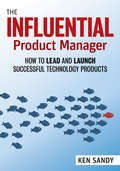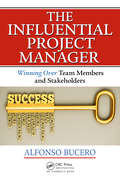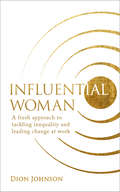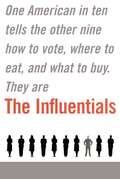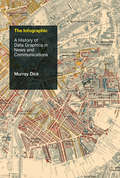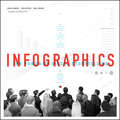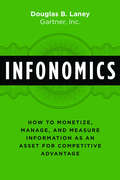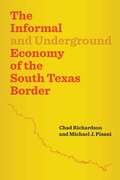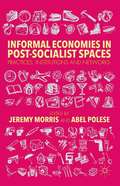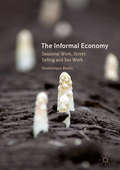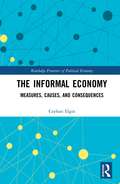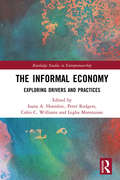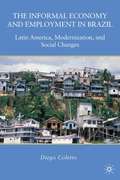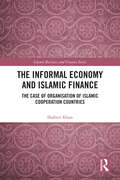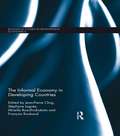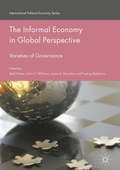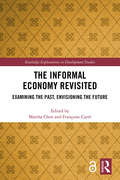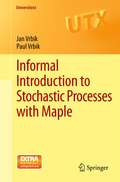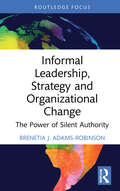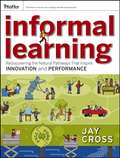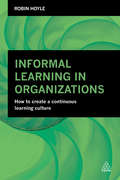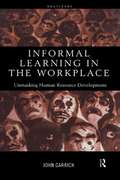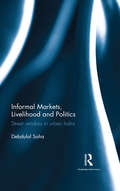- Table View
- List View
The Influential Product Manager: How to Lead and Launch Successful Technology Products
by Ken SandyThis book is a comprehensive and practical guide to the core skills, activities, and behaviors that are required of product managers in modern technology companies. Product management is one of the fastest growing and most sought-after roles by job seekers and companies alike. The availability of trained and experienced talent can barely keep up with the accelerating demand for new and improved technology products. People from nontechnical and technical backgrounds alike are eager to master this exciting new role. The Influential Product Manager teaches product managers how to behave at each stage of the product life cycle to achieve the best outcome for the customer. Product managers are under pressure to drive spectacular results, often without wielding much direct power or authority. If you don't know how to influence people at all levels of the organization, how will you create the best possible product? This comprehensive entry-level textbook distills over twenty years of hard-won field experience and industry knowledge into lessons that will empower new product managers to act like pros right out of the gate. With teaching experience both from UC Berkeley and Lynda.com, the author boils down the most complex topics into principles that are easy to memorize and apply. This book methodically documents the tools product managers everywhere use to align their teams with market needs and organizational goals. From setting priorities to capturing requirements to navigating trade-offs, this book makes it easy. Not only will your product succeed, you'll succeed, too, when you read the final chapter on advancing your career. Let your product's success become your success!
The Influential Project Manager: Winning Over Team Members and Stakeholders (Best Practices in Portfolio, Program, and Project Management)
by Alfonso Bucero MSc PMP PMI-RMP PMI FAll best practice recommendations and key success criteria point to the importance of developing soft skills as a project manager, but few sources exist about how to develop the power of influence for achieving better project and business results. Filling this need, this book supplies readers with guidance on how to improve their influence skills to achieve better business results. It explains how to set and meet ambitious goals for you, your team, and your stakeholders. It describes how to listen actively to influence people and how to build partnerships that can pay dividends for a lifetime.
Influential Woman: A Fresh Approach to Tackling Inequality and Leading Change at Work
by Dion JohnsonWomen around the globe are being divinely called to change the world of business with a new kind of leadership - it's time for us to wake up and prepare for the challenge. Why are we still seeing gender pay gaps and a lack of diversity in our workforces? We all know these systemic inequalities persist, so why haven't we fixed them yet? Dion Johnson has excelled in her field as a black woman in a white man's world; facially disfigured in a beauty-obsessed world; a devoted Christian in a secular world. She knows first-hand how unequal the system can be. In 2013, Dion, led by God, began challenging women leaders to respond to the call to show up, speak up and shake things the hell up in their industry. Since then, Dion has served passionately as a strategic ally supporting women to evolve, rise above leadership challenges, and be more influential in their role. In this book she offers a development framework for senior leaders who want to initiate hard change without sabotaging their health or self-esteem. Influential Woman has the power to spark a revolution in the way we lead and do business - to make the marketplace a force for love, justice and equality. We are influential women and now is our time to rise up and take action!
The Influentials
by Edward Keller Jonathan BerryOne American in ten tells the other nine how to vote, where to eat, and what to buy. They are The Influentials Who are they? The most influential Americans -- the ones who tell their neighbors what to buy, which politicians to support, and where to vacation -- are not necessarily the people you'd expect. They're not America's most affluent 10 percent or best-educated 10 percent. They're not the "early adopters," always the first to try everything from Franco-Polynesian fusion cooking to digital cameras. They are, however, the 10 percent of Americans most engaged in their local communities...and they wield a huge amount of influence within those communities. They're the campaigners for open-space initiatives. They're church vestrymen and friends of the local public library. They're the Influentials...and whether or not they are familiar to you, they're very well known to the researchers at RoperASW. For decades, these researchers have been on a quest for marketing's holy grail: that elusive but supremely powerful channel known as word of mouth. What they've learned is that even more important than the "word" -- what is said -- is the "mouth" -- who says it. They've identified, studied, and analyzed influence in America since the Standard Oil Company of New Jersey (now Exxon) hired Elmo Roper himself to develop a model for identifying opinion leaders, and in The Influentials, they are finally ready to share their results. A few samples: Influentials have been the "early majority" -- leading indicators of what Americans will be buying -- for more than five decades, from choosing energy-efficient cars in the 1970s to owning computers in the 1980s to adopting 401(k)s and IRAs in the 1990s to using the Internet and cell phones today. Influentials have led the way in social development as well, from the revival of self-reliance (in managing their own health care, investments, and consumption) to mass skepticism about the marketing claims of everything from breakfast food to politicians. Although America's Influentials have always been powerful, they've never been more important than now. Today, a fragmented market has made it possible for Influentials to opt out of mass-message advertising, which means that a different route must be taken to capture their hearts and minds. The Influentials is a map for that route, a map that explains who these people are, how they exercise influence, and how they can be targeted. The Influentials features a series of rules and guidelines for marketing to Influentials; case studies of products that have prospered because of Influential marketing (and products that have failed because they lacked it); a history of the phenomenon...and why Influentials are more influential today than ever; and profiles of twelve real-life Influentials. Both an intellectual adventure and a hands-on marketing manual, The Influentials is an extraordinary gold mine of information and analysis that no business can afford to ignore.
The Infographic: A History of Data Graphics in News and Communications (History and Foundations of Information Science)
by Murray DickAn exploration of infographics and data visualization as a cultural phenomenon, from eighteenth-century print culture to today's data journalism.Infographics and data visualization are ubiquitous in our everyday media diet, particularly in news—in print newspapers, on television news, and online. It has been argued that infographics are changing what it means to be literate in the twenty-first century—and even that they harmonize uniquely with human cognition. In this first serious exploration of the subject, Murray Dick traces the cultural evolution of the infographic, examining its use in news—and resistance to its use—from eighteenth-century print culture to today's data journalism. He identifies six historical phases of infographics in popular culture: the proto-infographic, the classical, the improving, the commercial, the ideological, and the professional.Dick describes the emergence of infographic forms within a wider history of journalism, culture, and communications, focusing his analysis on the UK. He considers their use in the partisan British journalism of late eighteenth and early nineteenth-century print media; their later deployment as a vehicle for reform and improvement; their mass-market debut in the twentieth century as a means of explanation (and sometimes propaganda); and their use for both ideological and professional purposes in the post–World War II marketized newspaper culture. Finally, he proposes best practices for news infographics and defends infographics and data visualization against a range of criticism. Dick offers not only a history of how the public has experienced and understood the infographic, but also an account of what data visualization can tell us about the past.
Infographics: The Power of Visual Storytelling
by Josh Ritchie Jason Lankow Ross CrooksTransform your marketing efforts through the power of visual content In today's fast-paced environment, you must communicate your message in a concise and engaging way that sets it apart from the noise. Visual content--such as infographics and data visualization--can accomplish this. With DIY functionality, Infographics: The Power of Visual Storytelling will teach you how to find stories in your data, and how to visually communicate and share them with your audience for maximum impact. Infographics will show you the vast potential to using the communication medium as a marketing tool by creating informative and shareable infographic content. Learn how to explain an object, idea, or process using strong illustration that captures interest and provides instant clarity Discover how to unlock interesting stories (in previously buried or boring data) and turn them into visual communications that will help build brands and increase sales Use the power of visual content to communicate with and engage your audience, capture attention, and expand your market.
Infonomics: How to Monetize, Manage, and Measure Information as an Asset for Competitive Advantage
by Douglas B. Laney<p>Many senior executives talk about information as one of their most important assets, but few behave as if it is. They report to the board on the health of their workforce, their financials, their customers, and their partnerships, but rarely the health of their information assets. Corporations typically exhibit greater discipline in tracking and accounting for their office furniture than their data. <p>Infonomics is the theory, study, and discipline of asserting economic significance to information. It strives to apply both economic and asset management principles and practices to the valuation, handling, and deployment of information assets. This book specifically shows: CEOs and business leaders how to more fully wield information as a corporate asset; CIOs how to improve the flow and accessibility of information; CFOs how to help their organizations measure the actual and latent value in their information assets. <p>More directly, this book is for the burgeoning force of chief data officers (CDOs) and other information and analytics leaders in their valiant struggle to help their organizations become more infosavvy. <p>Author Douglas Laney has spent years researching and developing Infonomics and advising organizations on the infinite opportunities to monetize, manage, and measure information. This book delivers a set of new ideas, frameworks, evidence, and even approaches adapted from other disciplines on how to administer, wield, and understand the value of information. Infonomics can help organizations not only to better develop, sell, and market their offerings, but to transform their organizations altogether.</p>
The Informal and Underground Economy of the South Texas Border
by Chad Richardson Michael J. PisaniMuch has been debated about the presence of undocumented workers along the South Texas border, but these debates often overlook the more complete dimension: the region’s longstanding, undocumented economies as a whole. Borderlands commerce that evades government scrutiny can be categorized into informal economies (the unreported exchange of legal goods and services) or underground economies (criminal economic activities that, obviously, occur without government oversight). Examining long-term study, observation, and participation in the border region, with the assistance of hundreds of locally embedded informants, The Informal and Underground Economy of the South Texas Border presents unique insights into the causes and ramifications of these economic channels. The third volume in UT–Pan American’s Borderlife Project, this eye-opening investigation draws on vivid ethnographic interviews, bolstered by decades of supplemental data, to reveal a culture where divided loyalties, paired with a lack of access to protection under the law and other forms of state-sponsored recourse, have given rise to social spectra that often defy stereotypes. A cornerstone of the authors’ findings is that these economic activities increase when citizens perceive the state’s intervention as illegitimate, whether in the form of fees, taxes, or regulation. From living conditions in the impoverished colonias to President Felipe Calderón’s futile attempts to eradicate police corruption in Mexico, this book is a riveting portrait of benefit versus risk in the wake of a “no-man’s-land” legacy.
Informal Economies in Post-Socialist Spaces
by Jeremy Morris Abel PoleseInformed by in-depth case studies focusing on a wide spectrum of micro and macro post-socialist realities from Lithuania to Kosovo, from Ukraine to China, this volume demonstrates the multi-faceted nature of informality and suggests that it is a widely diffused phenomenon, used at all levels of a society and by both winners and losers of post-socialist transition. In particular, by critically engaging with concepts such as bribery, nepotism and illegal transactions in general, the collection suggests that informality has a systemic reality not only at the micro but also, and more importantly, at the macro level. In an attempt to move beyond functionalist or structuralist perspectives, the authors propose that informality at the macro scale is an alternative way of responding to policy-making and that its reality must inform policy decisions.
The Informal Economy
by Dominique BoelsThis book examines the nature and regulation of the informal economy by means of a collective case study in a highly regulated Western country. The book, situated at the intersection of criminology and sociology, investigates the relation between formal, informal and criminal work in three urban and rural labour markets (seasonal work, street trade and sex work) alongside the impact of state policies on informality. Boels uncovers the differential position authorities take regarding these labour markets, notwithstanding the presence of informality and often vulnerable position of workers in each one of them. With a distinctive focus on informal workers, and through in-depth interviews, this study explores the life and work of informal workers, including their experiences with regulators, their motivations for working informally and their perceptions of state policy. In short, this book gives a voice to often ignored but crucial participants of the informal economy. The detailed discussion of the results and the links to theoretical frameworks will ensure this book is of particular interest to scholars of urban economics and governance, criminology, and sociology.
The Informal Economy: Measures, Causes, and Consequences (Routledge Frontiers of Political Economy)
by Ceyhun ElginThe Informal Economy: Measures, Causes, and Consequences provides a comprehensive account of the economics of informality through the lenses of various economic perspectives. Although informal economic activity is widespread all around the world, many issues around its nature and consequences remain largely under-explored or unresolved. Most importantly, the evidence presented in the existing literature on informality has failed to generate a consensus on the measurements, causes, and effects of the informal sector among researchers. Most, if not all, of the empirical results are inconclusive or dependent on the nature of the dataset used in the analysis. This book aims to address that gap by exploring different definitions and measures of the informal economy, including different perspectives, then subjecting these measures to a battery of empirical tests to examine the determinants and effects of informality. Through this analysis and an extensive review of the literature, the book explores many of the economic, political, and social factors of the informal economy including the relationship between informality and the tax burden, tax enforcement, and institutional quality. This key text makes for compulsive reading to scholars and students interested in the informal or shadow economy.
The Informal Economy: Exploring Drivers and Practices (Routledge Studies in Entrepreneurship)
by Peter Rodgers Ioana Horodnic Colin Williams Legha MomtazianDuring much of the twentieth century, informal employment and entrepreneurship was commonly depicted as a residue from a previous era. Its continuing presence was seen to be a sign of "backwardness" whilst the formal economy represented "progress". In recent decades, however, numerous studies have revealed not only that informal employment is extensive and persistent but also that it is growing relative to formal employment in many populations. Whilst in the developing world, the informal economy is often found to be the mainstream economy, nevertheless, in the developed world too, informality is currently still estimated to account for notable per cent of GDP. The Informal Economy: Exploring Drivers and Practices intends to engage with these issues, providing a much-need ‘contextualised’ approach to explain the persistence and growth of forms of informal economic practices and entrepreneurial activities in the twenty-first century. Using a diverse range of empirical case studies from Europe, Africa, North Africa and Asia, this book unpacks the different varieties of forms of informal work and entrepreneurship and provides a critical analysis of existing theorisations used to explain such phenomena. This book’s aim is to examine the nature and persistence of informal work and entrepreneurship, across a variety of empirical settings, from within the developed world, the developing world and within transformation economies within post-socialist spaces. Given its worldwide, interdisciplinary and multidisciplinary approach and recent interest in the informal economies by a number of disciplines and organisations, this book will be of vital reading to those operating in the fields of: Economics, political economy and management, Human and economic geography and Economic anthropology and sociology as well as development studies
The Informal Economy and Employment in Brazil: Latin America, Modernization, and Social Changes
by Diego ColettoThis book presents some in-depth cases regarding specific informal economic activities in Brazil. Using an ethnographic approach, the author shows the social and economic processes that allow the informal economy to be reproduced, revealing the complex and heterogeneous relations between the formal and the informal parts of economy.
The Informal Economy and Islamic Finance: The Case of Organisation of Islamic Cooperation Countries (Islamic Business and Finance Series)
by Shabeer KhanThe characteristics, nature, determinants, and size of the informal economy differ from country to country. While much research has been carried out in the context of advanced economies, less attention has been given to developing countries, especially those in the Organisation of Islamic Cooperation (OIC) nations. This is one of the first books to investigate Islamic finance’s stance on the informal economy and to discuss it from an OIC perspective. It covers the various definitions, historical development, types, and determining factors behind the shadow economy and the reasons for people’s preference to join and stay in the informal economy. Similarly, different theories are discussed in detail, thus providing a deeper understanding of the subject matter. The book examines the indicators of the informal sector, such as unemployment, regulation, and taxation, and the effect of financial development and the role of financial inclusion in informal economy in the case of OIC countries compared to non-OIC countries. It defines the main features of the informal economy and discusses their implications for policy formation and implementation. Additionally, the author provides guidance on Islamic finance’s role in the informal economy and offers policy recommendations in order to bring more people into the formal economy. The book presents deep and specialist knowledge on the shadow economy as well as facts and figures pertaining to OIC countries, and, as such, will open the door for future research in this important but understudied field, especially from an Islamic finance angle. It can be used as a comprehensive guide for students, academics, and researchers of Islamic studies, development economics, political economy, public policy, law, sociology, and anthropology.
The Informal Economy in Developing Countries (Routledge Studies in Development Economics)
by Jean-Pierre Cling Stéphane Lagrée Mireille Razafindrakoto François RoubaudInformality is ubiquitous in most developing countries. Understanding the informal economy is therefore of utmost importance from a political, economic and social point of view. Paradoxically, despite its economic importance, knowledge is extremely limited regarding the informal economy. It remains largely unrecognized by researchers, is neglected by politicians, and is even negatively perceived as it is meant to disappear with development. This book aims to amend this situation by presenting recent high level research which studies the informal sector and informal employment. Fresh research into this subject is presented through empirical analysis which covers Asia, Africa and Latin America. Each chapter relies on data and a detailed knowledge of the context of the countries studied in order to question the dominant schools of thought on the origins and causes of informality. The results provide interesting insights into the constraints faced by informal workers, the dynamics of the informal economy and its link with poverty issues. On the basis of the evidences provided by results adequate policies could be defined to address informality issues. The principal characteristics of the informal sector testify to some profound similarities between developing countries: low qualifications and the precariousness of jobs, mediocre incomes and working conditions, atomization of production units and lack of articulation with the formal economy, etc. This general statement does not contradict the observation that there is a high level of heterogeneity in the sector and in informal employment within each country, confirmed by several chapters in this work. In the absence of a sufficient number of job creations, the informal sector essentially constitutes a refuge for workers seeking and is here to stay in the short and medium term, even in emerging countries.
The Informal Economy in Global Perspective
by Abel Polese Colin C. Williams Ioana A. Horodnic Predrag BejakovicThis book critically engages with how formal and informal mechanisms of governance are used across the world. Specifically, it analyzes how the governance mechanisms of formal institutions are questioned, challenged and renegotiated through informal institutions. Whilst there is an emerging body of scholarship focusing on informal practices, this is scattered across a number of disciplines. This edited collection, by contrast, fosters a dialogue on these issues, moving away from monodisciplinary and normative methodologies that view informal institutions and practices simply as temporary economic phenomena. In doing so, the authors provide a wider understanding of how governance is composed of both the formal and the informal, which complement each other but are also constantly in competition. This novel approach will appeal to social scientists, economists, policy-makers, practitioners, and anyone else willing to widen their understanding of how governance works.
The Informal Economy Revisited: Examining the Past, Envisioning the Future (Routledge Explorations in Development Studies)
by Martha Chen Françoise CarréThis landmark volume brings together leading scholars in the field to investigate recent conceptual shifts, research findings and policy debates on the informal economy as well as future challenges and directions for research and policy. Well over half of the global workforce and the vast majority of the workforce in developing countries work in the informal economy, and in countries around the world new forms of informal employment are emerging. Yet the informal workforce is not well understood, remains undervalued and is widely stigmatised. Contributors to the volume bridge a range of disciplinary perspectives including anthropology, development economics, law, political science, social policy, sociology, statistics, urban planning and design. The Informal Economy Revisited also focuses on specific groups of informal workers, including home-based workers, street vendors and waste pickers, to provide a grounded insight into disciplinary debates. Ultimately, the book calls for a paradigm shift in how the informal economy is perceived to reflect the realities of informal work in the Global South, as well as the informal practices of the state and capital, not just labour. The Informal Economy Revisited is the culmination of 20 years of pioneering work by WIEGO (Women in Informal Employment: Globalizing and Organizing), a global network of researchers, development practitioners and organisations of informal workers in 90 countries. Researchers, practitioners, policy-makers and advocates will all find this book an invaluable guide to the significance and complexities of the informal economy, and its role in today’s globalised economy.
Informal Funds Transfer Systems
by Mohammed El Qorchi Samuel Munzele Maimbo John F. WilsonA report from the International Monetary Fund.
Informal Introduction to Stochastic Processes with Maple
by Paul Vrbik Jan VrbikThe book presents an introduction to Stochastic Processes including Markov Chains, Birth and Death processes, Brownian motion and Autoregressive models. The emphasis is on simplifying both the underlying mathematics and the conceptual understanding of random processes. In particular, non-trivial computations are delegated to a computer-algebra system, specifically Maple (although other systems can be easily substituted). Moreover, great care is taken to properly introduce the required mathematical tools (such as difference equations and generating functions) so that even students with only a basic mathematical background will find the book self-contained. Many detailed examples are given throughout the text to facilitate and reinforce learning. Jan Vrbik has been a Professor of Mathematics and Statistics at Brock University in St Catharines, Ontario, Canada, since 1982. Paul Vrbik is currently a PhD candidate in Computer Science at the University of Western Ontario in London, Ontario, Canada. .
Informal Labor, Formal Politics, and Dignified Discontent in India
by Rina AgarwalaSince the 1980s, the world's governments have decreased state welfare and thus increased the number of unprotected 'informal' or 'precarious' workers. As a result, more and more workers do not receive secure wages or benefits from either employers or the state. This book offers a fresh and provocative look into the alternative social movements informal workers in India are launching. It also offers a unique analysis of the conditions under which these movements succeed or fail. Drawing from 300 interviews with informal workers, government officials and union leaders, Rina Agarwala argues that Indian informal workers are using their power as voters to demand welfare benefits from the state, rather than demanding traditional work benefits from employers. In addition, they are organizing at the neighborhood level, rather than the shop floor, and appealing to 'citizenship', rather than labor rights.
Informal Leadership, Strategy and Organizational Change: The Power of Silent Authority (Routledge Focus on Business and Management)
by Brenetia J. Adams-RobinsonAcross the spectrum of organizational operations, workplace interactions have proven to be one of the most difficult activities for leaders to manage effectively, especially during any level of change. In these circumstances, leadership strategies, especially related to change and leadership transition, consistently fail at an alarming rate. Additionally, employee engagement and team collaboration continue to be among the most elusive concepts for those in leadership to master. This book explores the influence of the informal leader on team member engagement during major change initiative in the organizational paradigm, with a special emphasis on leaders who are new to the team composite. This book examines the role of the informal leader in promoting or hindering team member engagement and organizational citizenship behaviors in change dynamics with a focus on change in the leadership structure and major initiatives. The relationship between the formal and informal leader is explored to assess impact on team interactions and capacity to effectively execute change strategies. This book provides critical information to aid in organizations achieving long-term success and will be of interest to researchers, academics, and students in the fields of leadership, organizational studies, strategy, and human resource management.
Informal Learning
by Jay CrossMost learning on the job is informal. This book offers advice on how to support, nurture, and leverage informal learning and helps trainers to go beyond their typical classes and programs in order to widen and deepen heir reach. The author reminds us that we live in a new, radically different, constantly changing, and often distracting workplace. He guides us through the plethora of digital learning tools that workers are now accessing through their computers, PDAs, and cell phones.
Informal Learning in Organizations
by Robin HoyleAs the pace of change in the workplace accelerates and training budgets are challenged, it becomes essential for employees to learn as they go along. In this connected world, new ways of learning are emerging all of the time, whether the learning is planned, unexpected or self-directed. For those responsible for learning and development in organizations, understanding how this kind of informal learning can be utilised and measured is key to providing efficient and cost-effective ways of delivering on organizational objectives around people development. Informal Learning in Organizations offers practical tools, including checklists and action plan questions, to guide the Learning and Development practitioner in how to design and implement an informal learning strategy that is personalised to the needs of their own organization. It combines the latest thinking on new technology and practices with established theory and research to provide an evidence-based review of informal learning and its true impact. It offers an overview of how and why informal learning resonates with people, how it works and when and why it doesn't. This book will assist the reader in making sense of their connected environments to create a continuous learning culture in their organizations.
Informal Learning in the Workplace: Unmasking Human Resource Development
by John GarrickInformal learning has become an extremely important issue as post-industrial workplaces seek to harness its productive potential. Managers and HRD practitioners have attempted to deploy informal learning in the design of corporate cultures, however, most discussions of the subject have tended to be uncritical expositions which do not challenge the underlying economic, philosophical and organisational rationale. Uniquely, this book goes against this tendency. It critically examines definitions of informal learning, and focuses on its application in a variety of workplace contexts. It features: * theories of informal learning* the unmasking of contemporary corporate rhetoric * the implications for accounts of workplace learning of poststructuralist and post-modern perspectives. Incorporating case studies based on interviews with practising managers and HRM practitioners, and a detailed glossary of key concepts and issues, this book will be a valuable reference for students of workplace learning.
Informal Markets, Livelihood and Politics: Street vendors in urban India
by Debdulal SahaLow industrial growth, declining agricultural sector and limited expansion of formal sector employment in India have increasingly forced the poor to take recourse to informal sources of livelihoods. Street vending is one such thriving source of self-employment across cities. This book delves into the sustenance and survival strategies of street vendors across 17 cities in India and assesses the issues revolving around self-created markets, livelihood and politics that are contested in public space. It also presents a conceptual and theoretical understanding of different socio-economic and policy concerns pertaining to street vending in the country. The study shows how despite the absence of legal frameworks and institutional support, these urban self-employed informal workers subsist by arranging ad-hoc alternatives, creating informal institutions and negotiating with formal and informal actors in the market. It also discusses the Street Vendors (Protection of Livelihood and Regulation of Street Vending) Act, 2014, and examines how inclusive the legal recognition is for these workers of informal economy. Drawing on exhaustive research and a wealth of primary data, this book will be useful to scholars and researchers in development studies, labour studies, economics, sociology and those in public policy and urban planning.
